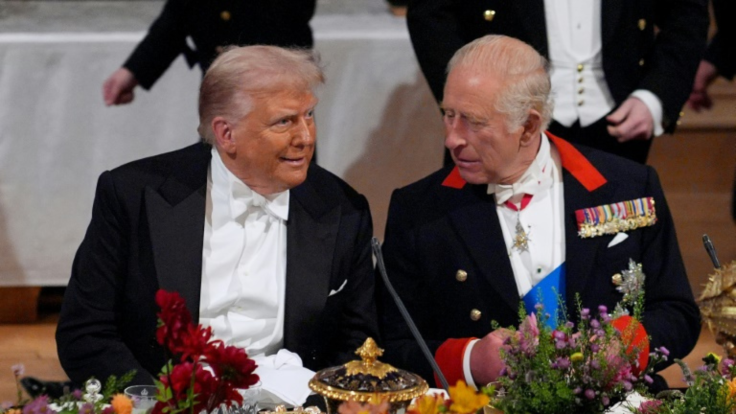The UK Welcomed Trump & Melania With A Lavish State Dinner. What Was The Trade-off?
President Trump's state visit ended with more than handshakes and toasts — Britain secured a record-breaking AI and nuclear pact

The UK rolled out a red carpet welcome for President Donald Trump and First Lady Melania, but what did Britain get in return? The real story lies in the £275 billion trade agreement signed behind closed doors.
As part of the state visit, the First Couple were honoured with a formal dinner at Windsor Castle. The event featured a seasonal British menu and was attended by senior members of the Royal Family, cabinet ministers, and top executives from the tech sector. Dressed in a British-designed gown, the First Lady accompanied the President through the Castle's grand halls before both leaders offered toasts to the renewed transatlantic partnership. The evening concluded with a classical performance by the Royal Philharmonic Orchestra. It was the first official state banquet hosted under UK Prime Minister Keir Starmer's leadership.
However, it was the trade agreement signing involving AI jobs, nuclear reactors, and the future of tech that truly made the state visit a memorable one.
A Historic Pact Signed at Chequers
On 19 September 2025, Prime Minister Starmer and President Trump signed the Technology Prosperity Deal, a joint memorandum committing £275 billion (approximately $350 billion) to artificial intelligence, nuclear energy, and quantum computing.
The signing took place at Chequers, the Prime Minister's country residence, as part of Trump's official state visit to the UK. While attention was drawn to the formal dinner and diplomatic pageantry, the signed deal represents one of the largest tech investment packages in UK history.
Leaders from both countries described the agreement as a 'blueprint' for shared growth, intended to create over 17,500 jobs and deliver cutting-edge technologies across the Atlantic.
What the Tech Prosperity Deal Includes
The agreement focuses on building AI infrastructure, boosting data centre capacity, and accelerating breakthroughs in drug development and healthcare.
As part of the deal, American tech firms such as Microsoft, NVIDIA, OpenAI, and Google committed more than £31 billion (approximately $39.4 billion) in new investment into the UK. This includes Microsoft's plan to build the largest AI supercomputer in the country, powered by over 23,000 GPUs in partnership with British firm Nscale.
Nscale will also lead the Stargate UK project, an AI infrastructure initiative involving up to 60,000 advanced chips designed to increase the UK's computing power dramatically.
AI Growth Zones and Regional Jobs
A key aim of the pact is to funnel investment into local regions. The North East of England has been earmarked as an AI Growth Zone, with an expected 5,000 jobs and billions in private investment linked to new data centre construction at Cobalt Park.
Google has pledged £5 billion (approximately $6.4 billion) over the next two years, including the development of a data centre in Waltham Cross, while CoreWeave will invest £1.5 billion (approximately $2 billion) in Scottish data centre operations powered by renewable energy.
Meanwhile, Salesforce will put in a further £1.4 billion (approximately $1.8 billion) to turn its UK branch into an AI hub for Europe by 2030.
Nuclear Energy: Clean Power and Strategic Independence
Another pillar of the deal includes the delivery of 12 advanced nuclear reactors in northern England, intended to power 1.5 million homes.
The civil nuclear agreement is aimed at reducing dependence on foreign energy supplies, particularly Russian uranium, by securing clean and homegrown energy alternatives. The UK has committed to ending its reliance on Russian nuclear fuel by 2028.
These reactors will support the energy demands of the AI and data infrastructure outlined in the wider pact.
Joint Projects in Quantum, Defence and Healthcare
Quantum computing is also a pillar of the agreement, with both governments pledging to collaborate on research and infrastructure.
British company Oxford Quantum Circuits has already installed New York City's first quantum computer, and a new quantum-AI data centre has been launched in collaboration with NVIDIA. US-based IonQ is also opening a £1 billion research and manufacturing centre in Oxford, in partnership with UK start-up Oxford Ionics.
Implementation Timeline and Regulatory Changes
The agreement is expected to take effect by mid-March 2026, with annual review meetings starting the following year, including regulatory cooperation between the US Center for AI Standards and Innovation and the UK AI Security Institute. This shared framework is designed to reduce barriers and support long-term collaboration across the AI, nuclear, and quantum sectors.
© Copyright IBTimes 2025. All rights reserved.




















